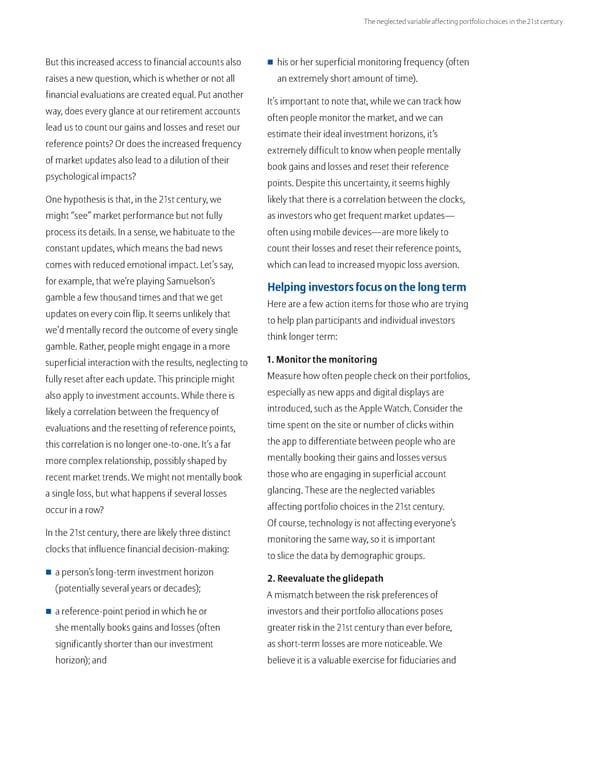The neglected variable affecting portfolio choices in the 21st century But this increased access to financial accounts also ◽ his or her superficial monitoring frequency (often raises a new question, which is whether or not all an extremely short amount of time). financial evaluations are created equal. Put another It’s important to note that, while we can track how way, does every glance at our retirement accounts often people monitor the market, and we can lead us to count our gains and losses and reset our estimate their ideal investment horizons, it’s reference points? Or does the increased frequency extremely difficult to know when people mentally of market updates also lead to a dilution of their book gains and losses and reset their reference psychological impacts? points. Despite this uncertainty, it seems highly One hypothesis is that, in the 21st century, we likely that there is a correlation between the clocks, might “see” market performance but not fully as investors who get frequent market updates— process its details. In a sense, we habituate to the often using mobile devices—are more likely to constant updates, which means the bad news count their losses and reset their reference points, comes with reduced emotional impact. Let’s say, which can lead to increased myopic loss aversion. for example, that we’re playing Samuelson’s Helping investors focus on the long term gamble a few thousand times and that we get Here are a few action items for those who are trying updates on every coin flip. It seems unlikely that to help plan participants and individual investors we’d mentally record the outcome of every single think longer term: gamble. Rather, people might engage in a more superficial interaction with the results, neglecting to 1. Monitor the monitoring fully reset after each update. This principle might Measure how often people check on their portfolios, also apply to investment accounts. While there is especially as new apps and digital displays are likely a correlation between the frequency of introduced, such as the Apple Watch. Consider the evaluations and the resetting of reference points, time spent on the site or number of clicks within this correlation is no longer one-to-one. It’s a far the app to differentiate between people who are more complex relationship, possibly shaped by mentally booking their gains and losses versus recent market trends. We might not mentally book those who are engaging in superficial account a single loss, but what happens if several losses glancing. These are the neglected variables occur in a row? affecting portfolio choices in the 21st century. Of course, technology is not affecting everyone’s In the 21st century, there are likely three distinct monitoring the same way, so it is important clocks that influence financial decision-making: to slice the data by demographic groups. ◽ a person’s long-term investment horizon 2. Reevaluate the glidepath (potentially several years or decades); A mismatch between the risk preferences of ◽ a reference-point period in which he or investors and their portfolio allocations poses she mentally books gains and losses (often greater risk in the 21st century than ever before, significantly shorter than our investment as short-term losses are more noticeable. We horizon); and believe it is a valuable exercise for fiduciaries and
 The Neglected Variable Affecting Portfolio Choices in the 21st Century Page 5 Page 7
The Neglected Variable Affecting Portfolio Choices in the 21st Century Page 5 Page 7